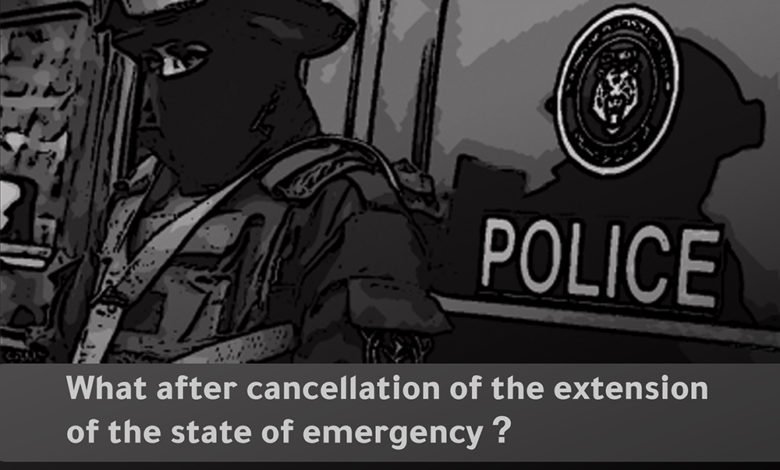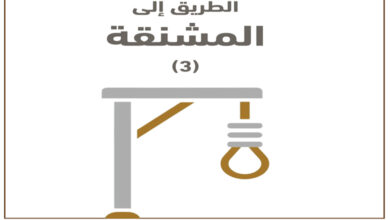?What after cancellation of the extension of the state of emergency

On the evening of October 25, 2021, the President of the Republic, Abdel Fattah El-Sisi, announced on his official “Facebook” page the cancellation of the extension of the state of emergency, after he had continued to issue decisions announcing and extending it at the level of the Republic since April 2017.
The abolition of the state of emergency is one of the seven steps demanded by several Egyptian organizations, including the Egyptian Commission for Rights and Freedoms, in May 2021 under the title #FirstSevenSteps, to achieve the minimum start to move forward on the way to address the human rights crisis in Egypt.
Thus, the step of canceling the state of emergency alone is not sufficient to bring about a tangible improvement in the human rights record in Egypt if it is not followed by many other decisions such as the release of political and human rights detainees, journalists and peaceful opponents and the cessation of a number of other repressive practices.
What, then, are the consequences of ending the state of emergency, i.e. stopping the operation of Law No. 162 of 1958 called the Emergency Law, taking into account the continued application of a package of other laws restricting rights and freedoms in Egypt?
I. What does the cancellation of the emergency state mean?
1. Ending the “emergency” jurisdiction of the Supreme State Security Prosecutions to consider cases in crimes that violate the provisions of the Emergency Law, and transferring jurisdiction to the regular prosecutors. However, this does not affect the competencies and powers of the Supreme State Security Prosecution granted to it by other laws and decisions, including the Anti-Terrorism Law of 2015.
2. Ending the possibility of referring cases in crimes that violate the provisions of the Emergency Law to “emergency” state security courts. Supreme State Security Courts are exceptional courts, and one of their main shortcomings is the inability to appeal their rulings by any method of appeal, which is in violation of Article 96 of the Constitution. Also, the rulings issued by them are considered final once the President of the Republic ratifies them.
3. Cancellation of some exceptional measures granted to the President of the Republic in accordance with Article 3 of the Emergency Law, which varied between placing restrictions on freedom and movement of people, and others related to financial and tax policies, and finally the amendments made by the President of the Republic in 2020 related to the President’s right to issue decisions to establish field hospitals or hospital performances during times of emergency.
4. Reference to rules of legality and restricting authorities of the President of the Republic and the broad powers granted to him in accordance with Article 3 of the Emergency Law, including, but not limited to, evacuating or isolating some areas, setting time for opening and closing public shops, assigning people to perform the work he requests, seizing movables and real estate according to provisions stipulated in the General Mobilization Law, and withdrawing licenses for weapons or ammunition and ordering their surrender.
5. The President of the Republic no longer has the authority to close an emergency case file before it is submitted to emergency courts, to order the temporary release of arrested suspects before referring the case to the “emergency” State Security Court, to reduce the sentence imposed when the ruling is presented to him, or replacing it with a lesser punishment, or annulling or suspending it, wholly or partially irrespective of its nature, whether original, complementary or consequential, or to suspend the execution of all or some of the penalties, or rescind the judgement while the case is closed, or order a re-trial before another circuit. Likewise, the President of the Republic, after ratifying the guilty verdict, had the right to annul the verdict while keeping the case, reduce the penalty, or stop its execution, unless the crime for which the verdict was issued was a felony of premeditated murder or complicity in it.
II. Second: What is the impact of canceling the state of emergency on cases referred to state security courts, and cases that have not yet been referred?
According to Articles 19 and 20 of the Emergency Law, after the end of the state of emergency, the Supreme State Security Courts remain “emergency” with jurisdiction to consider cases that have been referred to them in accordance with the procedures followed before them. As for crimes that are still in the investigation stage and the defendants have not been referred to the “Emergency” Supreme State Security Courts, they will be referred to regular prosecutors and are considered according to the general rules. Therefore, after this abolition of the state of emergency, the “emergency” Supreme State Security Courts will continue to have jurisdiction over all cases before them, which means that their rulings cannot be appealed in any way even after its termination, and the preservation of all authorities granted to the President of the Republic with regard to ratification of their judgments, which violates the standards of fair and equitable trial guaranteed by the provisions of the Constitution.
III. Does the President of the Republic have the authority to refer cases that were referred to the “emergency” state security courts to the ordinary judiciary?
In accordance with the general rules in the Code of Criminal Procedure and the principle of separation of authorities, when the case papers have been referred to court, it is not permissible to interfere in any way in it, and the judicial authority alone has the upper hand in disposing of it, otherwise it is considered a constitutionally prohibited act of interference. Therefore, in order to achieve the guarantees of a fair trial and to implement the principle of equality before the courts, and before declaring the abolition of the state of emergency, the President of the Republic had to use his powers under the emergency law itself, and refer all cases before the Supreme State Security Court to the ordinary judiciary in accordance with the concept of breach in the text of Article 9 of the Emergency Law, which allowed the President of the Republic to refer to “emergency” state security courts crimes punishable by common law.
IV. Is the abolition of the state of emergency an essential step towards a better achievement of justice and a real application of human rights standards?
Although the abolition of the state of emergency and the consequent termination of the emergency law and “emergency” Supreme State Security Courts are – for cases that have not yet been referred to them and for new cases – is without doubt a positive step, and ECRF had always supported any step that contributed, even partially in strengthening the pillars of human rights in Egypt, however, the spirit of the state of emergency, with its restrictions on freedoms and violations of the constitution, is still present and threatens the safe life of citizens in light of the persistent existence of a package of exceptional laws that restrict individual freedoms and support the authority in violating human rights, such as the anti-terrorism law and the Information technology crimes law, amendments to the Penal Code, the protest law, the universities regulation law, the Al-Azhar Organization Law, the law of dismissal from work without disciplinary procedure, the civil service law, and the Criminal Procedure Law with regard to prolonged detention. For example, Article 53 of the Anti-Terrorism Law of 2015 allows the President of the Republic, whenever a danger of terrorist crimes arises, to take appropriate measures to confront them, such as evacuating some areas, imposing curfews, or isolating them for a period of six months, which can be extended for indefinite periods of time, all without explicitly stipulating in Article 53 a declaration of a state of emergency, which entitles the President of the Republic to some “emergency” authorities , without declaring a state of emergency,
Also, the provisions of the Anti-Terrorism Law grant the executive authority exceptional powers similar to the powers found in the Emergency Law. Article 41 permits the arbitrary arrest and detention of suspects of terrorist crimes without informing their relatives or allowing them to seek the assistance of a lawyer in order to preserve the interest of the investigation; it even stipulates the lack of criminal accountability of police officers in the event of extrajudicial killing of suspects and defendants in terrorist cases under Article 8; Article 46 allows monitoring and recording of conversations and messages received on wired and wireless means of communication and other modern means of communication, recording and filming of private places, and other materials that have reproduced some texts that the Supreme Constitutional Court had previously ruled unconstitutional in the Emergency Law and the Penal Code.
The Emergency State: A background
The state of emergency is a set of exceptional measures taken by the state and constitutes a violation of general rules and grants broad powers to the President of the Republic, which allows him dominance over all the state’s executive, legislative and judicial authorities. It is announced whenever security or public order in the territory of the state or in an area of it is threatened, whether that is due to the outbreak of war or the emergence of a situation threatening its occurrence or the occurrence of internal disturbances such as armed insurrection, public disasters or the spread of epidemics.
Until yesterday’s decision to end the state of emergency, it had continued at the level of the republic for more than four years, a matter carried the suspicion of unconstitutionality because Article 154 of the Egyptian constitution in force issued in 2014 sets a maximum period for declaring a state of emergency for only three months that may be extended once for a similar period. That is, according to the article, the maximum limit for declaring a state of emergency is only six months, and the article was circumvented by leaving a short interval between the end of the extension of the state of emergency and the issuance of a new decision to declare it.
Article 154 of the 2014 constitution states: “The President of the Republic, after consulting the Council of Ministers, declares a state of emergency, in the manner regulated by law, and this declaration must be presented to the House of Representatives within the following seven days to decide what it deems appropriate. In all cases, the approval of the majority of the members of the House of Representatives is mandatory to declare a state of emergency, and it shall be declared for a specific period not exceeding three months, and it shall not be extended except for another similar period, after the approval of two-thirds of the members of the House of Representatives. If the House of Representatives is nonexistent, the matter is submitted to the Council of Ministers for approval, provided that it is presented to the new House of Representatives in its first meeting. The House of Representatives may not be dissolved while the state of emergency is in effect.”





